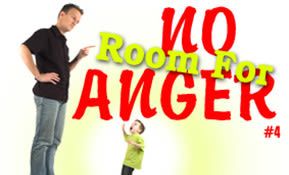
Their Little World
There are three tragic, but all too common, mistakes that parents make when raising their children. If we avoid them, they grow up to give us joy in this world and the next...

Anger has no place when it comes to educating children. Anger in a home shows tyrannical rule. You know what eventually happens to a tyrannical and dictatorial government? Rebellion.
One of the tragic mistakes parents make is that they sometimes think their children are purposefully annoying or trying to upset them. Such parents sometimes even develop hatred for their children (it sounds shocking but it happens!). The parent expects the child to behave and even act like a small adult. Parents want their children to understand and consider their own needs, but a parent who thinks mostly of himself has no concept of what goes on in the world of children.
Let your children flourish in their little world! Many parents readily agree with this, but the problem is that parents forget that once upon a time they were children too. They forget all about this little world – the magical world of children. Therefore today as adults, they are only focused on their own immediate needs and demands, and then they simply ruin their children's magical and wonderful world.
Therefore, dear parents, once you stop this unending race of demands on your children and begin to look honestly at your expectations, you will discover the harsh unfairness you are demonstrating.
The first thing you will discover from an honest reflection – is that your child did not mean or intend to annoy or hurt you at all. It is a tragic mistake that parents make, and which usually leads to a series of many more mistakes, to take the child's behavior personally. Recognize that this is an inherently flawed mistake.
Secondly – put yourself on the other side of the equation, where you become subject to the same demands and expectations you place on your children. Do you also always consider other people's needs? Have you really succeeded in overcoming your impulses and negative urges? Do you control your material desires as you require from your children? Think about it… If you can hardly expect such standards of yourself, how do you expect small children to possible live up to such high expectations?
In these difficult times before Moshiach, when the temptations on the street abound and the Evil Inclination uses all kinds of weapons to destroy the souls of our youth, many parents – and here I speak of "religious" parents – send me letters telling me that their children have gone off the straight path, the path of Torah. This is my explanation – the child, since being young and vulnerable, has been subject to anger and a sense of tyranny coming from you. These children experienced verbal abuse, or felt threatened by the consequence of a “fiery furnace” that they would have to go through because of one of their little mistakes. Because their "religious" parents represent the Torah, so in their eyes, children's eyes, they see and draw the one and only conclusion: "Who needs such a religion? Such anger and tyranny?" They often see their parents in a bad mood, and often angry, which is very typical of homes where the parents lack emuna. Therefore, they do not want any part in such a religion.
Therefore, parents must carefully examine the demands they place on their children. Sometimes they demand that the child has to go to bed at this very moment, while the child is not tired at all. They want the child to sit up straight on the chair while eating, and the child is generally an active and energetic type. When the child doesn’t fulfill his parents' wishes and doesn’t meet their expectations, then the parents take it personally and start to think all sorts of different ideas about their child – thoughts that are not accurate or related to the child at all.
A child has only his little world, and a parent whose needs and expectations are self-centered cannot possibly be sensitive to that world. Or, the parent simply does not put the child’s little world on his radar. Therefore, he makes all the mistakes mentioned in all the books on child education. When parents try setting an example or exercise discipline without understanding the child, know that it is not education at all. Parenting and educating cannot be based on forcefulness. Just the opposite; Forcing and coercion ultimately lead to the opposite reaction from the child.
Lastly, remember that rebuke and criticism have no place at all in the home! It doesn’t have a place when it comes to our spouses, and it doesn’t have a place when it comes to our children either. Rabbi Nachman warned us very much about this matter – to avoid reproach and criticism of those around us, especially in the home – and especially with our loved ones. And especially with our children, who are flowers that must be treated with care since they are tender and growing. Criticism, comments and rebuke has no place whatsoever in educating children!
I know that up until this point, I explained my words clearly and without qualifications, because in these matters I believe that it is very important to inspire parents in order to help them in their personal growth as parents. However, I want you to understand that one of the most important parts of our daily personal prayer, which is all about personal development and growth, is spending time to ask G-d to help up be better parents. To pray to be warm and loving parents, and that our children should grow up to love Him, and love Torah and Judaism. Beg Hashem to lead you on the proper and loving, thoughtful and nurturing path – the path of being a truly good parent.














Tell us what you think!
Thank you for your comment!
It will be published after approval by the Editor.